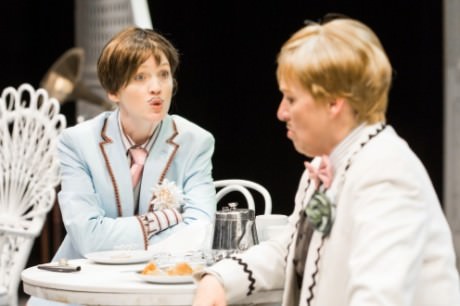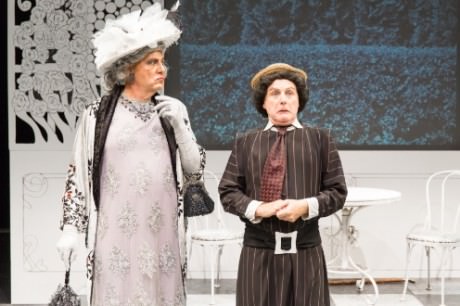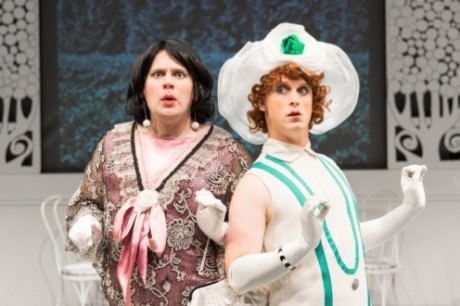Scena Theatre has brought back its hit 2011 production of The Importance of Being Earnest, Oscar Wilde’s classic comedy of errors, and DC’s summer just got wittier and sweeter. In Scena’s delectable staging, the show plays like a clockwork confection, and serves up Wilde’s biting bon mots like a shop full of bon bons.
With a twist.

Director Robert McNamara (Scena’s Founder and Artistic Director) has cast the show with actors who in life do not present as the gender of the character they play. (Once upon a time one would say they play characters of “the opposite sex”—but nowadays the words opposite and sex in this context have become, as Wilde might say, curiously unfashionable.) The entertaining result is a blurring of gender expression that, as Wilde might say, has become curiously fashionable. Not to mention great fun.
Wilde held a mirror up to the society he lived in, in zinger after zinger. And in The Importance of Being Earnest, not a few of his snarky apothegms send up conventions of male and female social behavior. The captivating result in Scena’s cross-gender-cast production is that such quips in the script take on fresh resonance.
For instance when Danielle Davy, who plays a dandy, arrogant Algernon, says with a frat-boy leer and winks…
The only way to behave to a woman is to make love to her, if she is pretty, and to someone else, if she is plain.
the line becomes all the more incisive. And when she (as he) says…
All women become like their mothers. That is their tragedy. No man does. That’s his.
…the line becomes all the more trenchant.
David Bryan Jackson, who plays the prim and prissy Miss Prism to a tea-cake, at one point says to the Rev. Chasuble, whom Ms. Prism has romantic designs on…
You are too much alone, dear Dr. Chasuble. You should get married. A misanthrope I can understand—a womanthrope, never!
…and instantly, because the right rector is played with winning shyness by Amie Cazel, Wilde’s neologism for misogyny lands as more than a jest—it gets meta.

Though the text treats in this production are plentiful, what puts it over the top are the performances. Notable among them is Nanna Ingvarsson, who plays the deceitful lady-killer Jack aka John aka Earnest. Written as a bit of a fop, Jack in Ingvarsson’s portrayal becomes more of a swaggering dude, as when she (as he) sits and totally nails manspreading. The play’s lens on gender sharpens as the imperious Lady Bracknell is played by Ingvarsson’s real-life husband, Brian Hemmingsen. Though called in the script “a Gorgon” and “monster,” Lady Bracknell in Hemmingsen’s prepossessing portrayal has a dramatic authority that self-evidently towers over and intimidates everyone else on stage without drag-bitch cliches.
Said clichés do show up hilariously, however, in the performances of Graham Pilato as Gwendolyn (who is smitten with Jack, thinking his name is Earnest) and Robert Scheire as Cecily (who falls for Algernon, thinking his name is Earnest). Their coy seductions of their beaus are ridiculously apt—with Pilato scurrying everywhere on tiny tiptoe and Scheire slinking about languidly. And the vicious catfight they have when they discover they are both betrothed to the same Earnest is hysterical. Curiously, as Wilde might say again, in these two actors’ portrayals, the script’s sendup of fatuous femininity becomes sillier yet more gently knowing.

Ellie Nicoll as Lane and Mary Suib as Merriman each bring an intriguing archness to the roles of the two manservants and add to the topsy-turvy ensemble.
Scenic Designer Michael C. Stepowany has set the action amid wedding-cake-like white filigree and trellises, which Lighting Designer Marianne Meadows brings brightly aglow. The cast is truly dressed to the nines, and special commendation goes to Costume Designer Alisa Mandel, whose eye-popping creations appear in the accompanying photos.
A screen upstage programmed by Projection Content Designer Tony Starnes shows black-and-white photographs of period cityscapes and country estates, which nicely locates the script’s sense of place. Now and then the screen also projects texts that comment on the action, such as “Enter the Dragon!” when Lady Bracknell appears and “Tea for Two,” when that is in fact what’s happening. (Whether these glosses add to one’s experience will be a matter of taste. For me Wilde’s play in this production was already plenty meta, so I paid the interpolations little attention—but nor did they detract.)
On top of being tres trendy, Scena—in having female characters as conceived by a man given voice by male actors, and in simultaneously having female actors give voice to male characters conceived by the same dead white male playwright—has achieved cheeky counter-programming to DC’s current Women’s Voices Theater Festival. I doubt that was the company’s intention (Earnest was swapped in at the eleventh hour when, sadly, a previously announced production of Three Sisters had to be cancelled). But as a tantalizing theatrical interrogation into the contemporary meaning of gender in society, it worked brilliantly.
All told, Scena’s The Importance of Being Earnest is an enlightening light entertainment as delicious and satisfying as can be.
Running Time: Two hours 15 minutes, including one 15-minute intermission.
The Importance of Being Earnest plays through Septmber 13, 2015, at Scena Theatre, performing at The Paul Sprenger Theatre at Atlas Performing Arts Center – 1333 H Street NE, in Washington, D.C. For tickets, call (202) 399-7993 ext. 2, or purchase them online.





